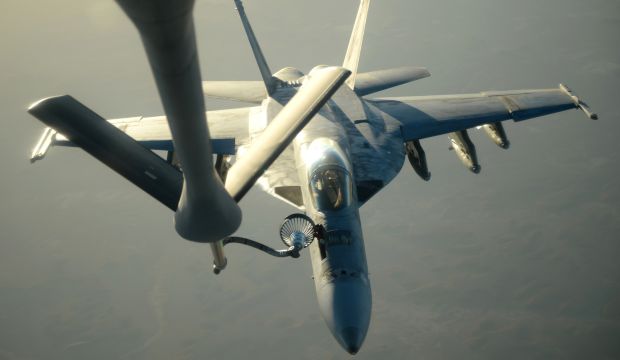The Middle East has witnessed a flurry of diplomatic activity in recent months, including visits by various leaders from around the world to the region’s capitals, particularly Riyadh. Following all this activity we have seen Jordan, Egypt and Turkey all step up their involvement in the international coalition fighting the Islamic State of Iraq and Syria (ISIS) in the region. This is something worth pausing over, as it represents a major turning point in relations between four of the most important countries in the region concerned with the outcome of the ongoing conflict in Syria—that is: Saudi Arabia, Turkey, Egypt, and Jordan—and provides an opportunity for the Kingdom especially to play a central role here.
All this diplomatic activity cannot be detached from the state of the relationships the countries in the region currently have with others outside it, particularly those from Western Europe and the United States. All the recent meetings, exchanged messages, and joint statements between representatives from countries in the region and those visiting from outside it show complete consistency in terms of the positions held by both, with all this taking place within the context of the efforts against ISIS, which have now become a kind of blueprint for the war against terror as such.
The recent diplomatic efforts should not also be detached from efforts to increase military cooperation between the regional members of the coalition—along the lines of recent Iraqi–Iranian coordination in the fight against ISIS in Iraq, where we saw how Iranian fighter jets were given the go-ahead by Baghdad to bomb ISIS targets in the central Iraqi city of Tikrit. The kind of military cooperation I’m talking about also resembles that offered by the United States, Saudi Arabia, Turkey and Qatar to train and equip the moderate armed opposition in Syria. It also resembles recent efforts by the French to market their own Rafale fighter jets to coalition members the UAE and Egypt to use to bomb the group—and, in fact, Egypt has been using Rafales it has purchased from France as part of its recent air offensive against ISIS in Libya.
But amid all the meetings and diplomatic activity, it would seem the main aim here is to expand the current fight into an international war against all terror groups around the world, and not just ISIS, using the current fight as a springboard to defeat first ISIS itself—and not only in Syria and Iraq, but also Libya, Egypt and anywhere else it rears its ugly head—and then its other sinister cousins.
By most accounts the airstrike campaigns currently being carried out against ISIS by coalition members need serious bolstering. Such moves could include the formation of a regional military force to fight ISIS in the region—which would represent a major strategic turning point in the conflict so far because it is impossible to defeat and destroy this group without direct confrontation involving ground troops. From here we can look to train domestic fighting groups such as the Kurdish Peshmerga and arm them with enough weapons and ammunition to enable them to really take the fight to ISIS, as is happening right now among the Syrian armed opposition.
But this would still not be enough to really take the fight against the group to the next level. Parallel to the aforementioned steps, the countries of the region and the rest of the international community would need to step up their efforts to cut off financing to ISIS, stem the tide of fighters joining the group from around the world, and effectively monitor and sabotage its much talked-about media campaigns.
The current efforts against the group represent an important step in terms of bringing together different and wide-ranging international and regional military capabilities within a single force, in addition to the indirect efforts targeting ISIS’s streams of financing and manpower, and its highly sophisticated media machine.
So the international coalition against ISIS, led by the US, took initial form in the shape of targeted airstrikes against the group in Syria and Iraq. But it was soon realized that the airstrikes would not be enough, that the fight needed to be widened. When these changes came, positive results followed—but there are yet further steps that can be taken.
First among them in terms of importance is of course widening the scope of the military offensive against ISIS to include other terrorist–extremist groups as well. This would mandate expanding the target list so it also includes the forces of Syrian President Bashar Al-Assad—certainly no stranger to the “terrorist” label since this conflict began and whose regime we know has been involved closely with terrorist groups.
The second step would involve offering humanitarian aid and assistance to the people living in territory under ISIS’s control and to help normalize everyday life for them once again. The third, meanwhile, requires planning and launching anti-extremist media campaigns, ones focusing especially on how these groups have veered away from orthodox Islam and indeed perverted it through their ideologies, and on showing how joining such groups takes one out of the fold of Islam—or any other religion, for that matter. We have many examples of such campaigns, whether past or current ones, which concentrate on this point, that extremist and terrorist groups are the first to break basic religious and ethical norms on how to treat others.
The war on terror groups is a crucial one, and what is most crucial about it is that it be a wide-ranging and comprehensive fight, garnering the support and involvement of the largest possible slice of the international community and using all weapons, military or otherwise, at our disposal. If this is not achieved then the war on terror will not succeed in defeating a single one of these groups, and the fight will go on longer, giving enough time for the terror groups of today to hatch, like Al-Qaeda did before them with ISIS and Al-Nusra, the terror groups of tomorrow.
